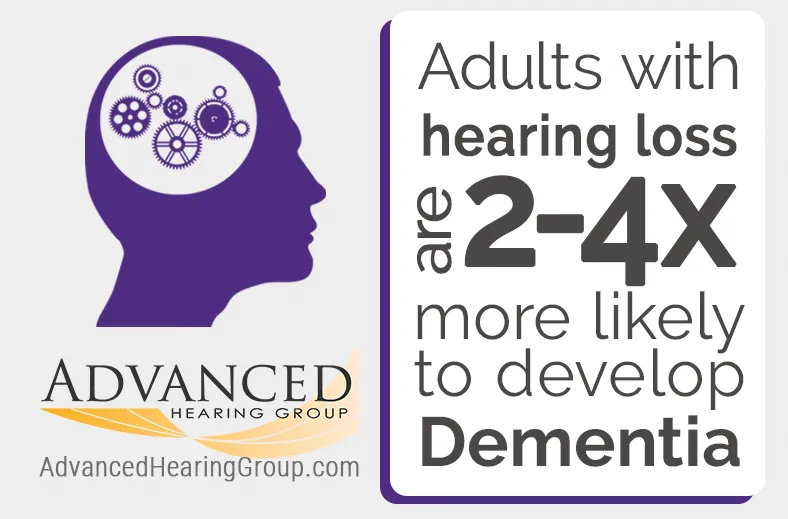Cognitive Decline
& Hearing Health


How are Hearing Loss and Cognitive Decline Connected?
Hearing loss is common as we age. However, due to the slow progression of hearing loss, it can easily be overlooked and left untreated. Untreated hearing loss can do much more than limit communication abilities with friends and family or cause the TV to be “too loud”. Perhaps the most vital concern surrounding untreated hearing loss is cognitive decline.
What Can I Do?
Early intervention is absolutely critical!
And it may lessen the impact hearing loss has on cognitive function and slow the decline. Call Advanced Hearing Group to schedule an evaluation and a hearing test – we are here to help.
⬇️ Watch the Video to Learn More! ⬇️
Research Behind the Hearing Loss-Cognitive Decline Connection
In research led by Johns Hopkins Bloomberg School of Public Health, in conjunction with seven other institutions, Dr. Lin and others completed a landmark study exploring the effects of treated and untreated hearing loss on cognition.
Research Findings:
The severity of untreated hearing loss strongly correlated to increased risk factors for dementia.
The study suggested that a person with mild, untreated hearing loss will have a two-fold increase in risk factors for developing dementia. An individual with a moderate, untreated hearing loss will experience a three-fold increase in their risk factors. Lastly, if the hearing loss is severe, the risk factors will increase five-fold.
For more information regarding this study please reference the ACHIEVE study by Dr. Lin et al published and presented in July of 2023.
How Does Untreated Hearing Loss Contribute to Cognitive Decline?
The evidence between untreated hearing loss and dementia and/or accelerated cognitive decline is growing by the day. The reasons behind this connection are complicated and multifaceted.
It is undeniable that untreated hearing loss has a profound effect on the brain. For example, people with untreated hearing loss regularly isolate themselves. This social isolation, coupled with reduced stimulation of the auditory cortex, causes neural atrophy.
Another cause may be the overwhelming burden that untreated hearing loss places on areas of the brain that process speech. The processing of a damaged or unclear signal adds additional strain.
There are many other factors that contribute to cognitive decline but one thing is certain; untreated hearing issues have a profound effect on the brain and cognition.
Key Facts About How Hearing Loss Impacts Cognitive Functioning
Hearing loss and cognitive decline are increasingly recognized as interconnected issues, especially as research continues to reveal their complex relationship. Here are some interesting facts about the connection between untreated hearing loss and cognitive decline:
1. Increased Risk of Dementia and/or Cognitive Decline
Studies have suggested that people with untreated hearing loss are significantly more likely to develop dementia. The risk increases with the severity of hearing loss, with severe hearing loss being associated with up to a five-fold increased risk for developing dementia.
2. Brain Structural Changes
Hearing loss can lead to changes in brain structure, especially in areas responsible for processing sound. The brain regions associated with hearing may shrink or atrophy. This atrophy contributes to cognitive decline.
3. Cognitive Load Hypothesis
When someone has hearing loss, their brain works harder to process sound. This reduces resources available for other cognitive functions, leading to cognitive decline.
4. Social Isolation
Hearing loss can lead to social isolation because it makes communication difficult. Social isolation is a known risk factor for cognitive decline and dementia since it reduces mental stimulation. This can then cause neural atrophy, which leads to increased risk factors for dementia and cognitive decline. Social isolation also increases risk factors for depression.
5. Hearing Aids May Maintain Cognitive Function
Studies suggest that using hearing aids can slow cognitive decline in older adults with hearing loss. By improving communication and reducing cognitive load, hearing aids may help maintain cognitive function. Improved communication reduces social isolation and lowers risk factors for depression.
6. Early Hearing Loss as a Predictor
Hearing loss in midlife (ages 45-65) has been identified as one of the major modifiable risk factors for dementia and/or cognitive decline later in life. Early diagnosis and treatment of hearing loss could potentially delay or prevent the onset of cognitive decline.
7. Emotional and Psychological Effects
Hearing loss can lead to depression and anxiety, which are also risk factors for cognitive decline. The emotional toll of hearing loss, combined with reduced cognitive function, can create a vicious cycle that exacerbates both conditions.
Hearing Loss, Dementia, and Cognitive Decline Resources
The link between untreated hearing loss and cognitive decline and/or dementia are irrefutable. The evidence is piling up and there is no end in sight. If you or a loved one is having difficulty hearing, make an appointment with a local hearing healthcare provider.
If you or a loved one is experiencing memory problems, dementia, cognitive decline, or Alzheimer’s Disease, please explore the resources provided below:
- The Alzheimer’s Association
- Join ALZConnected
- The Alzheimer’s Foundation of America
- Contact your local Office of the Aging
Your Audiologist in Scottsdale & Mesa
We promise to always take the time to listen and talk with you one-on-one, ensuring that we answer all your questions thoroughly.
Happy Patients
Hear Well. Live Well.
 "My life is changed forever with my new Phonak Paradise hearing aids. I’m so proud and thankful that I tell everyone I meet how wonderful it is to hear paper rustling and my own footsteps on the floor again. It is a miracle and a blessing. Thank you Adam Dipuccio and doctors at AHG for my new life!!!"
"My life is changed forever with my new Phonak Paradise hearing aids. I’m so proud and thankful that I tell everyone I meet how wonderful it is to hear paper rustling and my own footsteps on the floor again. It is a miracle and a blessing. Thank you Adam Dipuccio and doctors at AHG for my new life!!!"
 "We want to thank Dr. Johnson and the staff at the South Scottsdale office for their prompt service. When I had a problem with one of my hearing aids, they saw me within an hour of my call to their office, and resolved the problem in a few minutes. We appreciate a business that is so helpful and caring."
"We want to thank Dr. Johnson and the staff at the South Scottsdale office for their prompt service. When I had a problem with one of my hearing aids, they saw me within an hour of my call to their office, and resolved the problem in a few minutes. We appreciate a business that is so helpful and caring."
 "Hearing restored! After sleepless nights and plenty of irritation I went to Advanced Hearing Group for a Ear Wax Removal. Super fast, professional, and kind. The staff here really know what they doing. Even in the waiting room it felt like I walked into a family. The nurses, doctors, and any other staff perfectly work together to get things done. ”
"Hearing restored! After sleepless nights and plenty of irritation I went to Advanced Hearing Group for a Ear Wax Removal. Super fast, professional, and kind. The staff here really know what they doing. Even in the waiting room it felt like I walked into a family. The nurses, doctors, and any other staff perfectly work together to get things done. ”
 "Dr. Johnson did a wonderful job evaluating what would work for me. He is very pleasant, listens to the needs of the patient, answers all questions, and makes you feel very comfortable. I have been helped with hearing aids for both my tinnitus and hearing loss. Don’t hesitate to go see Dr. Johnson if you are in need... He is the best in the business!"
"Dr. Johnson did a wonderful job evaluating what would work for me. He is very pleasant, listens to the needs of the patient, answers all questions, and makes you feel very comfortable. I have been helped with hearing aids for both my tinnitus and hearing loss. Don’t hesitate to go see Dr. Johnson if you are in need... He is the best in the business!"
 "I had a hearing aid quit on me. I went into the Mesa location and was greeted by a pleasant young lady and was promptly helped to get my hearing aid working again. And there was no charge !! Great service and pleasant staff. What a great experience !!"
"I had a hearing aid quit on me. I went into the Mesa location and was greeted by a pleasant young lady and was promptly helped to get my hearing aid working again. And there was no charge !! Great service and pleasant staff. What a great experience !!"
 "After many years of working with Advanced Hearing at their Mesa, AZ location, I continue to be impressed by their high level of service and support! Everyone I've encountered at this office is always very friendly and helpful. I commend the staff... for having a caring attitude towards patients and going above and beyond to understand their unique needs and find suitable solutions.”
"After many years of working with Advanced Hearing at their Mesa, AZ location, I continue to be impressed by their high level of service and support! Everyone I've encountered at this office is always very friendly and helpful. I commend the staff... for having a caring attitude towards patients and going above and beyond to understand their unique needs and find suitable solutions.”
 “I have been using AHG for several years and they have been just great to work with. I get the hearing devices I need and they are well taken care of by AHG while I own them. Gary is a great audiologist and the receptionist is always helpful, friendly and available. Try them, you’ll like them.”
“I have been using AHG for several years and they have been just great to work with. I get the hearing devices I need and they are well taken care of by AHG while I own them. Gary is a great audiologist and the receptionist is always helpful, friendly and available. Try them, you’ll like them.”

“We do not know how to thank you for the amazing professionalism and compassion you demonstrated to our family recently in addressing the hearing loss of my wife. Your kindness far exceeded your obligation as an Audiologist to provide competent professional care and we are very grateful. We were so fortunate to find you.”
 "AHG has taken care of both me and my family for the past 10 years. Their staff is courteous, pliable, and attentive. The audiologists are skilled, and armed with a vast knowledge in a wide array of platforms to better assist the needs of their clients on an individual level. I have always felt listened to and comfortable, in all interactions with them. Whenever I meet someone with hearing aids, I always give my highest recommendation for them to go to Advanced Hearing Group.”
"AHG has taken care of both me and my family for the past 10 years. Their staff is courteous, pliable, and attentive. The audiologists are skilled, and armed with a vast knowledge in a wide array of platforms to better assist the needs of their clients on an individual level. I have always felt listened to and comfortable, in all interactions with them. Whenever I meet someone with hearing aids, I always give my highest recommendation for them to go to Advanced Hearing Group.”
